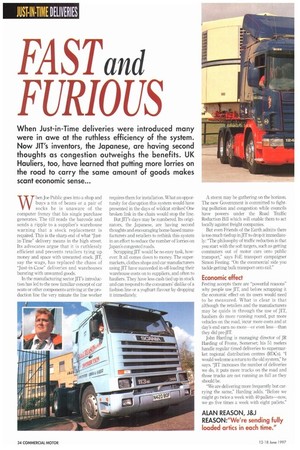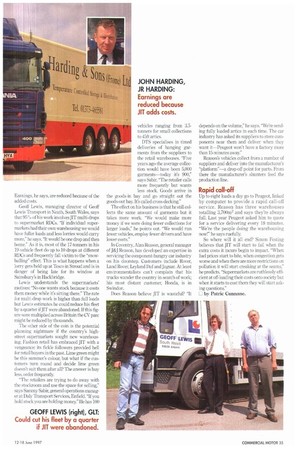FAST and
Page 46

Page 47

If you've noticed an error in this article please click here to report it so we can fix it.
FURIOUS
When Just-in-Time deliveries were introduced many were in awe at the ruthless efficiency of the system. Now Mrs inventors, the Japanese, are having second thoughts as congestion outweighs the benefits. UK Hauliers, too, have learned that putting more lorries on the road to carry the same amount of goods makes scant economic sense...
When Joe Public goes into a shop and buys a tin of beans or a pair of socks he is unaware of the computer frenzy that his single purchase generates. The till reads the barcode and sends a ripple to a supplier's warehouse warning that a stock replacement is required. This is the sharp end of what "Just. in-Time" delivery means in the high street. Its advocates argue that it is ruthlessly efficient and prevents retailers tying up money and space with unwanted stock. JIT, say the wags, has replaced the chaos of "Just-in-Case" deliveries and warehouses bursting with unwanted goods.
In the manufacturing sector JIT's introduction has led to the now familiar concept of car seats or other components arriving at the production line the vury minute the line worker requires them for installation. What an opportunity for disruption this system would have presented in the days of wildcat strikes! One broken link in the chain would stop the line.
But J1T's days may be numbered. Its originators, the Japanese, are having second thoughts and encouraging home-based manufacturers and retailers to rethink this system in an effort to reduce the number of lorries on Japan's congested roads.
Scrapping JIT would be no easy task, however. It all comes down to money. The supermarkets, clothes shops and car manufacturers using JIT have succeeded in off-loading their warehouse costs on to suppliers, and often to hauliers. They have less cash tied up in stock and can respond to the consumers' dislike of a fashion line or a yoghurt flavour by dropping it immediately. A storm may be gathering on the horizon. The new Government is committed to fighting pollution and congestion while councils have powers under the Road Traffic Reduction Bill which will enable them to act locally against freight companies.
But even Friends of the Earth admits there is too much tied up in JIT to drop it immediately; "The philosophy of traffic reduction is that you start with the soft targets, such as getting commuters out of motor cars onto public transport," says FoE transport campaigner Simon Festing. "On the commercial side you tackle getting bulk transport onto rail."
Economic effect
Festing accepts there are "powerful reasons" why people use J1T, and before scrapping it the economic effect on its users would need to be measured. What is clear is that although the retailers and the manufacturers may be quids in through the use of PT, hauliers do more running round, put more vehicles on the road, incur more costs and at day's end earn no more—or even less—than they did pre-JIT.
John Harding is managing director of JR Harding of Frome, Somerset; his 51 reefers handle regular timed deliveries to supermarket regional distribution centres (RI)Cs). "I would welcome a return to the old system," he says. "JIT increases the number of deliveries we do, it puts more trucks on the road and those trucks are not running as full as they should be.
"We are delivering more frequently but carrying the same," Harding adds. "Before we might go twice a week with 40 pallets—now, we go five times a week with eight pallets." Ear rUngs, he says, are reduced because of the added costs.
Geoff Lewis, managing director of Geoff Lewis Transport in Neath, South Wales, says that 95% of his work involves JIT multi-drops to supermarket RDCs. "If individual supermarkets had their own warehousing we would have fuller loads and less lorries would carry more," he says. "It would be one drop and then home." As it is, most of the 17-tonners in his 19-vehicle fleet do up to 10 drops at different RDCs and frequently fall victim to the "snowballing" effect. This is what happens when a lorry gets held up at Tesco in Stroud and is in danger of being late for its window at Sainsbury's in Hackbridge.
Lewis understands the supermarkets' motives: "No one wants stock because it costs them money while it's sitting there." The rate for multi-drop work is higher than full loads but Lewis estimates he could reduce his fleet by a quarter HAT were abandoned. if this figure were multiplied across Britain the CV parc might be reduced by thousands.
The other side of the coin is the potential planning nightmare if the country's highstreet supermarkets sought new warehousing. Fashion retail has embraced JIT with a vengeance: its fickle followers provided hell for retail buyers in the past. Lime green might be this summer's colour, but what if the customers turn round and decide lime green doesn't suit them after all? The answer is buy less, order frequently.
"The retailers are trying to do away with the stockroom and use the space for selling," says Sammy Sabir, general operations manager at Daly Transport Services, Enfield. "If you hold stock you are holding money." He has 100 vehicles ranging from 3.5tonners for small collections to 45ft artics DTS specialises in timed deliveries of hanging garments from the suppliers to the retail warehouses, "Five years ago the average collection would have been 5,000 garments—today it's 900," says Sabin "The retailer calls more frequently hut wants less stock. Goods arrive in the goods-in bay and go straight out the goods-out hay. It's called cross-decking."
The effect on his business is that he still collects the same amount of garments but it takes more work. "We would make more money if we were doing fewer collections for larger loads," he points out. "We would run fewer vehicles, employ fewer drivers and have lower costs."
In Coventry, Alan Reason, general manager of J&J Reason, has developed an expertise in servicing the component-hungry car industry on his doorstep. Customers include Rover, Land Rover, Leyland Daf and Jaguar. At least environmentalists can't complain that his trucks wander the country in search of work; his most distant customer, Honda, is in Swind Does Reason believe JIT is wasteful? "It depends on the volume," he says. "We're sending fully loaded artics in each time. The car industry has asked its suppliers to store components near them and deliver when they want it Peugeot won't have a factory more than 15 minutes away."
Reason's vehicles collect from a number of suppliers and deliver into the manufacturer's "platform"—a drop-off point for parts. From there the manufacturer's shunters feed the production line.
Rapid call-off
Up to eight loads a day go to Peugeot, linked by computer to provide a rapid call-off service. Reason has three warehouses totalling 3,700m2 and says they're always full. Last year Peugeot asked him to quote for a service delivering every 18 minutes. "We're the people doing the warehousing now!" he says ruefully.
So where will it all end? Simon Festing believes that Ja will start to fail when the extra costs it incurs begin to impact. "When fuel prices start to bite, when congestion gets worse and when there are more restrictions on pollution it will start creaking at the seams," he predicts. "Supermarkets are ruthlessly efficient at off-loading their costs onto society but when it starts to cost them they will start asking questions."
LI by Patric Cunnane.
























































































































